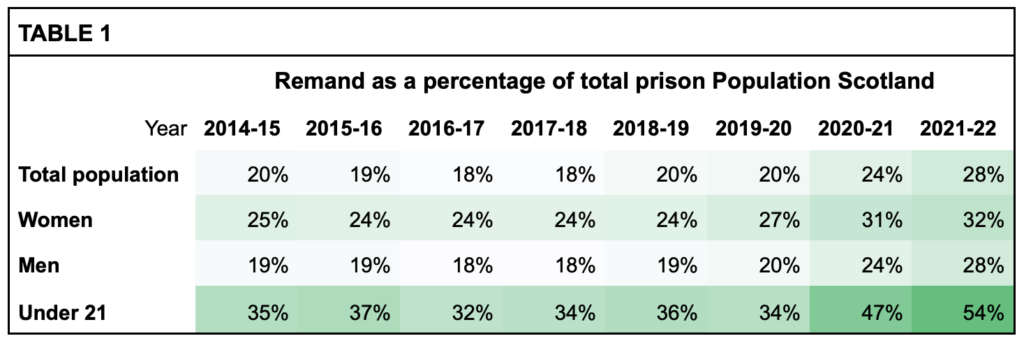Service Manager, Centre Services (Justice), Glasgow Health & Social Care Partnership
Glasgow Health and Social Care Partnership (GHSCP) Justice Social Work Services provides a Bail team within Glasgow Sheriff Court. The service has a number of functions:
- to provide Bail information to Courts in relation to suitability of the proposed bail address;
- to provide Bail Supervision and Electronic Monitoring assessments to Court regarding suitability for Bail Supervision and/or Bail with Electronic Monitoring; and
- to supervise individuals who are subject to Bail Supervision in the community.
The team currently consists of 8 Social Care Staff with plans in place to recruit a further 3, due to the expected increase in demand on the service.
Bail Supervision is intended to provide a robust and credible alternative to Remand in custody, whereby people accused or convicted of an offence (or offences) are assessed as requiring a level of supervision, monitoring, and support to adhere to Bail conditions. Those who the court may decide would otherwise be held on Remand pending trial or for reports after conviction can instead be released on Bail on the condition that they meet with a Bail Supervisor a specified number of times per week, subject to an assessment of suitability. The overarching aim of Bail Supervision is therefore to reduce the use of Remand by giving confidence to the court that people bailed in the community will be supported to comply with the conditions of Bail, and that any non-compliance will be robustly managed.
The overarching objective of Bail Supervision is to provide a credible alternative to Remand available for courts to use in appropriate cases which aims to:
- Provide support to people in the community, which minimises disruption to families, employment, and housing – this includes direct support to individuals as well as signposting / referring into other services such as addictions, homelessness, benefits advice, employment support and health services.
- Promote positive outcomes for people and their families (where appropriate), taking account of the needs and impact on others including victims, children, family, and community members, while supporting and monitoring compliance with Bail conditions and the overall criminal court process.
“Mr G was originally made subject to a Bail Supervision Order in September 2020 and was on Bail Supervision until August 2021. Mr G was subject to two separate orders due to him committing another offence while on Bail Supervision. Mr G engaged well with his supervising officer having had weekly contact since his original order was granted, which resulted in 21 office appointments, one home visit and 28 telephone contacts.
When Mr G was made subject to Bail Supervision, he was currently on a Community Payback Order (CPO), open to addiction services and he had been homeless for approximately 2 years. He had a long-term addiction issue with alcohol and drugs. Due to chronic liver damage and as a result of previous attacks he was diagnosed with Hepatic Encephalopathy which, is a decline in brain function that occurs as a result of severe liver disease, resulting in memory loss and cognitive issues. Mr G as result of his memory issues was not aware that he was subject to a CPO.
As result of Bail Supervision, I liaised with his Criminal Justice worker to ensure that his appointments ran alongside his Bail Support appointments at Norfolk Street which meant he completed his CPO successfully. I made a referral to SACRO and worked closely with his worker at SACRO. We made a referral to Housing First and Mr G was eventually offered his own tenancy close to his mother who is his full-time carer.
We also ensured that Mr G and his mother knew of all Court appearances to ensure that he did not miss any due to his memory loss. This was not an easy process and had its issues along the way. SACRO also supported Mr G and his mother to apply for benefits, council tax, furniture for his new home, a blue badge for his mother to support Mr G to Court appearances etc.
To date Mr G still remains in his own tenancy, supported by addiction services and Housing first and although there has been further offending this has been significantly reduced since he was first made subject to a BS Order.”
The Management of Offenders (Scotland) Act 2019 allows for Electronic Monitoring (EM) as part of Bail conditions. This legislation changes the way in which curfew restrictions as part of Bail can be monitored – it does not change the underpinning Bail Legislation or the criteria for determining the suitability of the person for Bail. Bail Supervision may be imposed along with EM as part of Bail if a court wishes to do so (EM as part of Bail can also be imposed without Bail Supervision, and there is the option of a standalone bail order).
At this time, the form of Electronic Monitoring available in Scotland is radio frequency monitoring, (a box in a curfew location or in an “away from” location, monitoring presence at or absence from, a place). A person’s compliance with the condition(s) of the relevant Order is monitored electronically by their wearing of a PID (personal identification device) around their ankle (often referred to as a “tag”) along with a home monitoring unit installed in their place of residence. The PID communicates with the home monitoring unit via a radio frequency (RF) signal. The home monitoring unit continuously collects and stores data from signals sent by the PID and alerts the monitoring company if the person is not within range within the pre-set time frame. The EM service provider will report any non-compliance to Police who will decide on the most appropriate action to be taken in response to an alert in each case. Where Bail Supervision is in place alongside Electronic Monitoring, non-compliance will also be reported back to Justice Social Work (JSW).
In her article in the 2020-21 Annual Reporter ‘The Scandal of remand in Scotland’, Karen Baxter, Policy Officer, Community Justice Scotland set out why Remand continues to be an issue in Scotland and in Glasgow city and how Covid 19 had compounded the situation. In the 2019-20 Annual Reporter in the article ‘Reducing Remand – Improving Bail Support’, Karen also set out the improvement actions agreed by the Community Justice Glasgow Partnership to improve the Bail support offer in Glasgow and give those assurances to the judiciary around robust alternatives to Remand. You can read both of those articles by CLICKING ON THE PICTURE LINKS BELOW:
Remand, as a proportion of the prison population ins Scotland, is continuing to increase. Table 1 (below) shows how this has changed since 2014-15, and how this has peaks for each group, Men, Women and young people under 21, in the year 2021-22. While some of this may be attributed to changes in prisoner type – during COVID restrictions when court activity was reduced certain offence types were prioritised – however, it can be seen that this pattern has been developing since before such restrictions came into place.

Community Justice Glasgow therefore are working with partners to create conditions for people who are going to trial, to ensure that bail is seen as a viable option to sentencers. The Improvement Plan for bail support continues to be progressed, building upon some of the improvements mentioned in the article The Scandal Of Remand In Scotland.








